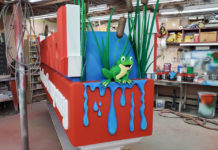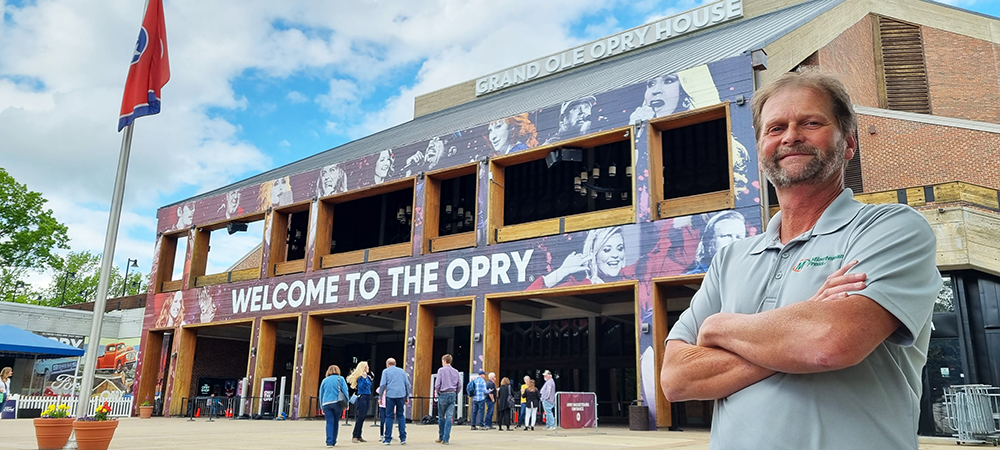
The Grand Ole Opry House, owned by Ryman Hospitality Partners, is one of the most legendary music venues in the USA. Thanks to John Taylor and his team at Minuteman Press in Nashville, Tennessee, the face of the Grand Ole Opry House now looks as good on the outside as the music sounds on the inside—thanks to a recent full-wrap exterior rebranding.
Taylor has owned his Minuteman Press in Nashville business since January of 2014 and is a member of the President’s Club for top performers across the Minuteman Press franchise system.
What started out as a sales call and business cards order ten years ago has evolved into a trusted branding partnership between Taylor’s Minuteman Press and Ryman Hospitality.
“Working inward through the marketing department at Ryman Hospitality, a relationship developed,” says Taylor. “They have a lot of printers, but we stayed in touch, cross-selling where possible.”
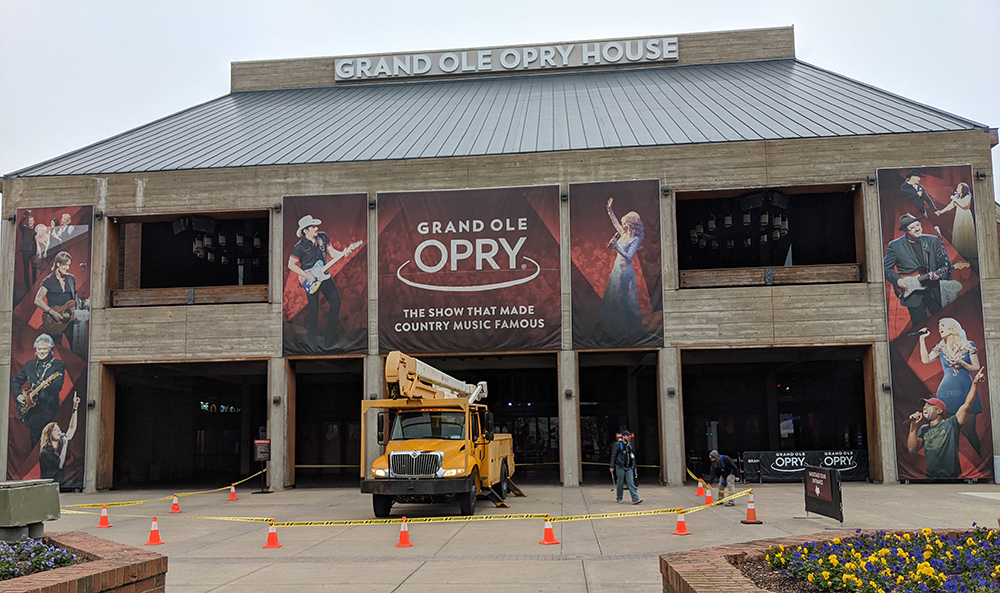
Taylor’s shop set them up on an online portal ordering system for their printed collateral and admin items of their various brands.
“We make it a habit to deliver all prospects our branded Minuteman Press ‘Portfolio Thumb-drive,’” he says. “It goes to them pre-loaded with our most impressive projects in categorized folders. That led to us becoming one of their trusted branding partners. I would like to say their preferred branding partner, as we’ve done projects from Nashville to New York City for them as they open new venues.”
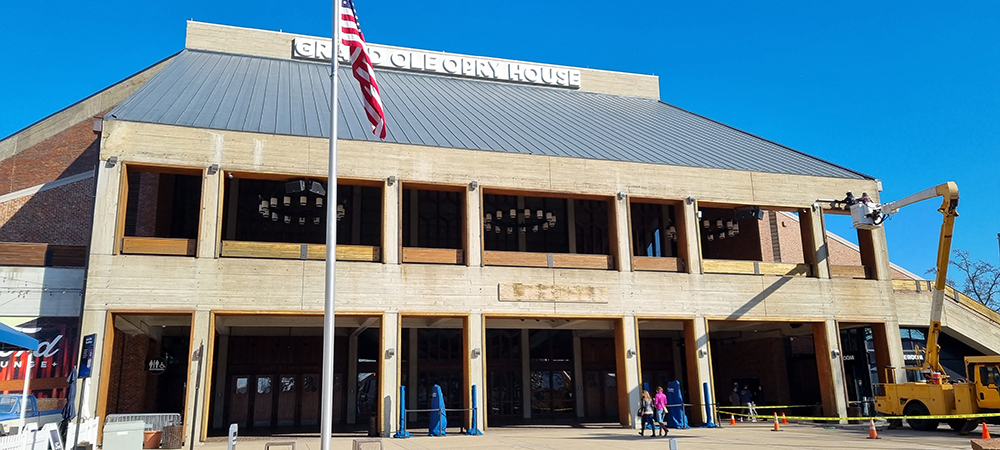
And the result of that partnership includes incredible projects like this full-wrap exterior rebranding of the Grand Ole Opry House.
“We have done multiple projects at the Grand Ole Opry House,” says Taylor. “Regarding this project: It is an extraordinary surface in that it is stamped concrete. It is made to look like a ‘rough-cut cedar’ wooden surface, with deep woodgrain and over a half-inch depth difference between the faux planks.”
Taylor explains that there are two installation processes in this type project. “One is to install and register the [fifty-eight-inch-wide] panels together,” he says, “and the second process is to heat and press the vinyl into the grain and contours with a heat gun/torch and foam hand roller, roughly four inches at a time.”
The timetable to complete this project was roughly seven weeks.
Minuteman Press in Nashville measured, scaled, and templated the whole project the first week, providing them a template for technical artwork and construction.
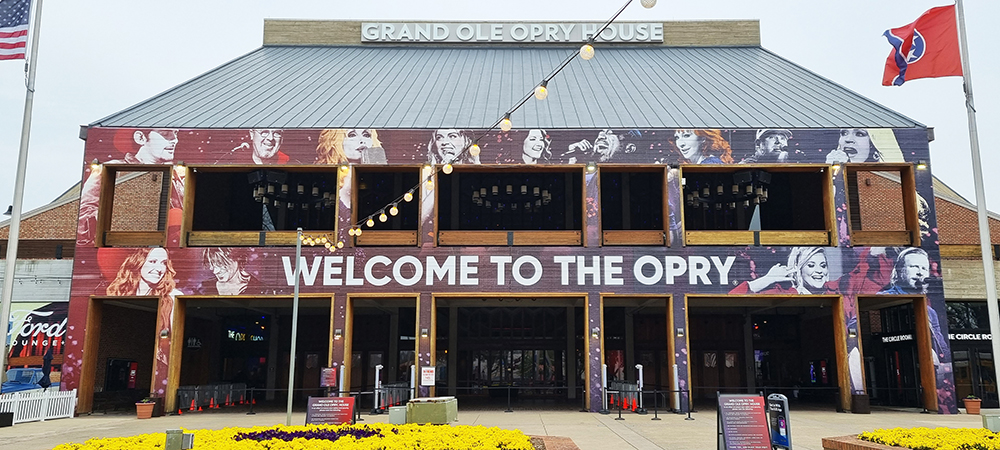
“The exterior, as all large branding projects do, began with an intense set of measurements and a write-up of all inclusions and challenges with the surface(s),” says Taylor. “We then created an Illustrator template for their art department, advising best practices and highlighting any areas to which they should pay special attention during design.”
It took Ryman Hospitality two to three weeks to develop art, get the individual artists’ approvals, and the necessary internal management approvals. “We removed the old banners and aluminum hardware,” says Taylor, “as well as prepped/cleaned the building during that period.”
Minuteman Press in Nashville then printed the graphics onto 3M IJ-480 vinyl with 3M 8520 Matte Overlaminate using their HP 360 Latex printer. They then laminated the vinyl on a GBC roll laminator.
Taylor says that he asked for seven to ten days to produce the vinyl. “It took about a week to print, laminate, and cut,” he says.
The shop used their company-owned fifty-five-foot boom truck and a rented forty-five-foot boom lift to install the vinyl.
“We should have been able to install it in roughly one week with a crew of three,” says Taylor. “It ended up taking two weeks, since the Grand Ole Opry hosts shows every couple of days, which limited our time. We had to be packed up and out of the way by 3 pm. Weather was also a factor.”
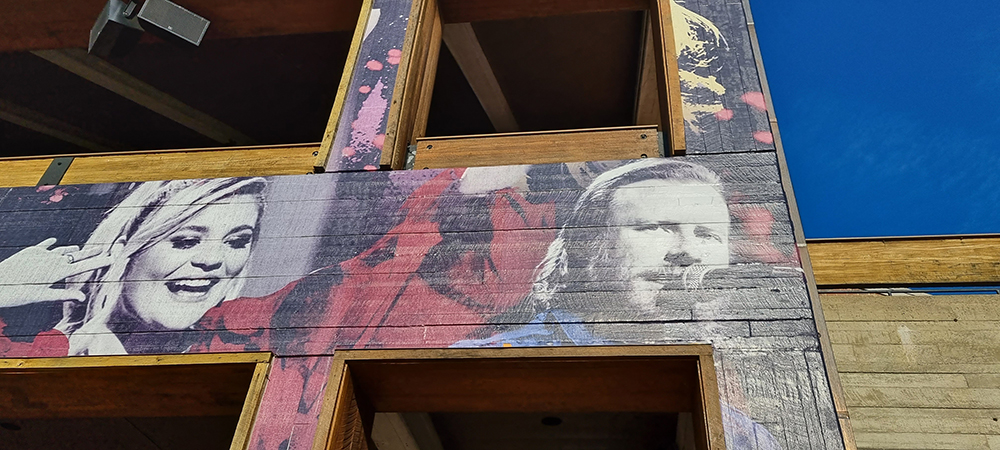
They arrived to work each morning and blocked off an area so tours could still safely operate every thirty to sixty minutes.
Taylor adds that his shop installed in close coordination with the security team every day and evening to avoid periodic live shows in the evenings altogether. “The first team and truck would hang and register the vinyl,” says Taylor. “The second lift would have a heat gun, a torch, and a roller to get into the grain…and a single installer with very tired arms.”
In the end, Taylor is “extremely happy” how this Grand Ole Opry House rebranding project turned out, saying that he was “humbled” and “honored” to have been given this opportunity. “Now, for the less-than-humble perspective,” he adds. “It was an intense scope of work—and we got the job done!
Taylor says that his shop has received nothing but positive feedback ever since this installation went up.
“People are loving the new face of the Grand Ole Opry House,” he says. “My favorite reaction was from a security guard who said, ‘I haven’t seen this many people stop and have their pictures taken in front of the building in years!’ He’s been there over fifteen years, so that was so gratifying to hear.
“To have our hard work appreciated, especially on such a large-scale project, it’s just a great feeling of accomplishment.”
—Press Release




